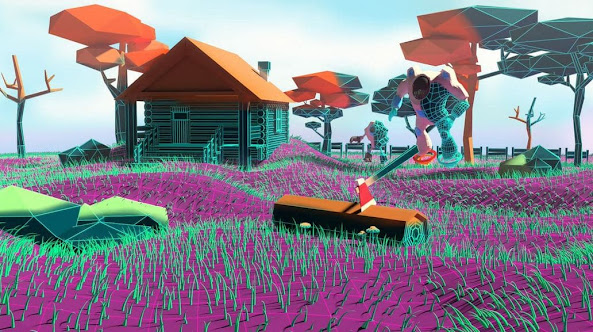ESSAY : ''' '' BLOCKCHAINS
BREW BLOOMINGS '' '''
THE AVATARS ARE MOSTLY CARTOON versions of people. They are all milling around a swimming pool built like a funnel, with virtual water sliding out of sight through its navel.
To move, users manipulate keyboard controls familiar to anyone who misspent their youth playing computer games :
W, A, S, D to walk forwards, left, backwards and right; space bar to jump.
A sign next to the pool reads ''diving allowed ''.
Your correspondent presses W and her flaxen- haired simulated self climbs up and over the edge of the red diving board, plunging into the pool's centre.
THIS IS what it is like to enter Decentraland, a virtual-reality platform built on the Ethereum blockchain, also known as ''metaverse'' where virtual shops sell digitable collectables and tokens.
The disorientating ''down the rabbit hole'' feeling of diving in is all too similar to what you feel when you first hear of developers' efforts to ''decentralise'' everything you do online.
A growing number of them are seeking to rebuild both the financial system and the internet economy using blockchains - data based distributed over many computers and kept secure by cryptography.
The ultimate goal is to replace intermediaries like global banks and tech platforms with software built on top of networks that direct the value they generate back to the users who own and run them.
A BLOCKCHAIN IS AN IMMUTABLE SHARED HISTORY : It is common, in tech circles, to hear a business pitch that is simultaneously simple and baffling.
''It is going to be like ''X'' [ insert the name of any successful business ], but on a blockchain.''
The eager entrepreneur is quick to assume that everyone is both familiar with the technology and agrees on its merits. But what is a blockchain? And what are the benefits of using it meant to be?
A BLOCKCHAIN is a database that contains the history of whatever information it was designed to store. It is made of a string of '' blocks '' of information that build on top of one another in an immutable chain.
BITCOIN, one of the first blockchains, was built in 2009. It stores data on transactions in bitcoin, providing proof of who owns what at any time.
What distinguishes a blockchain from other databases is that its ledger is distributed, publicly available and replicated on thousands of computers - or '' nodes '' - around the world.
Rather than a centralised entity, like a bank or a tech platform, ensuring that the ledger is accurate, it is verified by a decentralised network of individuals.
Though Bitcoin's blockchain is public, it is also trustworthy and secure.
This is guaranteed by the mixture of mathematical subtlety and computational brute force built into its ''consensus mechanism'', the process by which the nodes verify new transactions and add them to the blockchain.
Computers race to solve a cryptographic problem - the first to do so wins newly mined coins - and a new block is added.
NEWER blockchains, like Ethereum, store more information, such as lines of computer code.
A function or application that can be programmed in code can be guaranteed to operate as written.
The Ethereum blockchain offers proof that the code was executed. Developers can write conditional code - software that executes after a certain trigger - making it possible to set up '' smart contracts '' about future events.
Unlike private networks, open public blockchains are transparent [ anyone can view them ], permissionless [ anyone can use them ] and censorship - resistant [ no one can stop them ].
But because they demand consensus, they can be slow and complex to build.
Building ' applications ' that conduct financial activities and distribute digital content on top of a blockchain can therefore be trickier than operating through trusted intermediaries.
Building ''X'' on a blockchain may be sensible, but is easier said than done.
The Honor and Serving of the Latest Global Operational Research on Blockchain Technology, Present and Future, continues. The World Students Society thanks author The Economist.
With respectful dedication to the Scientists, Innovators, and All Crypto companies, and to The Future of building consensus. See Ya all prepare and register for Great Global Elections on The World Students Society : wssciw.blogspot.com and Twitter - !E-WOW! - The Ecosystem 2011 :
Good Night and God Bless

.png)


0 comments:
Post a Comment
Grace A Comment!